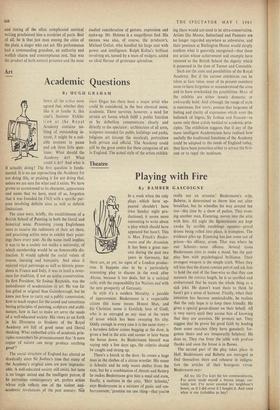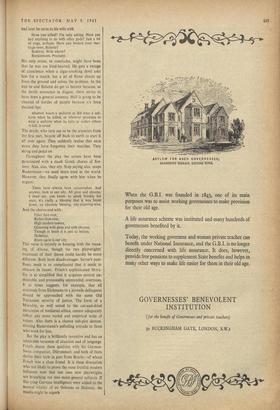Theatre
Playing with Fire
By BAMBER GASCOIGNE
In style it's a modern Morality, a parable of appeasement. Biedermann is a respectable citizen (his name means Honest Man, and his Christian name is Gottlieb, love of Gad), who is as outraged as any man at the wave of arson which has been sweeping his city. Oddly enough in every case it is the same story— a harmless fellow conies begging at the door, is given a bed in the attic and sooner or later burns the house down. As Biedermann himself was saying only a few days ago, the culprits should be caught and strung up.
There's a knock at the door. In comes a huge man in the clothes of a circus wrestler. His name is Schmitz and he only wants shelter. from the rain; but by a combination of threats and flattery he makes Biedermann give him a meal and even, finally, a mattress in the attic. 'Herr Schmitz,' says Biedermann in a mixture of panic and em- barrassment, 'promise me one thing—that you're really not an arsonist.' Biedermann's wife, Babette, is determined to throw him out after breakfast, but he wheedles his way around her too—this time by a show of pathos. That even- ing another man, Eisenring, moves into the attic with him. All night the Biedermanns are kept awake by terrible rumblings upstairs—petrol drums being rolled into place, it transpires. The evidence piles up. Eisenring has just come out of prison—his offence, arson. That was where he met Schmitz—same offence. Several times Biedermann tries to make a stand, but. the pair play him with psychological brilliance. Their strongest weapon is the simple truth. When they tell him that the drums contain petrol and ask him to hold the end of the fuse-wire so that they can measure the correct length, he is so terrified and embarrassed that he treats the whole thing as a sick joke. He doesn't want them to think he hasn't got a sense of humour. Finally, when their intention has become unmistakable, he realises that the only hope is to keep them friendly. He gives a special goose-dinner on their behalf. All is very merry until they accuse him of knowing that they are arsonists. He protests not. They suggest that he prove his good faith by lending them some matches (they have genuinely for- gotten theirs and are temporarily helpless). He does so. They rise from the table with profuse thanks and soon the house is in flames.
The second part of the play takes place in Hell. Biedermann and Babette are outraged to find themselves there and rehearse in indigna- tion the articles of their bourgeois virtue. Biedermann says: All my life I've kept the ten commandments.
I've never made myself a brazen image, cer- tainly not. I've never coveted my neighbour's house, or if I did covet it I bought it. And since when is one forbidden to buy? and later he turns to his wife with
Have you killed? I'm only asking. Have you had anything to do with other gods? Just a hit of yoga, perhaps. Have you broken your mar- riage vows, Babette?
BABETTE. With whom?
BIEDERM ANN. Precisely.
His only crime, he concludes, might have been that he was too kind-hearted. He gets a twinge of conscience when a cigar-smoking devil asks him for a match, but a jet of flame shoots up from the ground and solves the problem. In the end he and Babette do get to heaven because, as the devils announce in disgust, there seems to have been a general amnesty. Hell is going to be cheated of hordes of people because its been decided that
whoever wears a uniform or did wear a uni- form when he killed, or whoever promises to wear a uniform when he kills or orders others to kill, is saved The devils, who turn out to be the arsonists from the first part, bicycle off back to earth to start it all over again. They suddenly realise that once more they have forgotten their matches. They shrug and pedal on Throughout the play the scenes have been punctuated with a mock Greek chorus of fire- men. Alas, alas, they cry. Stop saying alas, snaps Biedermann—we need more trust in the world. However, they finally agree with him when he argues:
There have always been catastrophes. And anyway. look at our city. All glass and chrome. I must say, you know, to speak frankly for once, it's really a blessing that it was burnt down, an absolute blessing, city-planning-wise. And the chorus end with: Finer than ever, Richer than ever, High modern towers, Gleaming with glass and with chrome, Though at heart it is just as before, Halleluja, Risen again is our city.
This verse is entirely in keeping with the mean- ing of Ahona, though the two playwrights' treatment of their theme could hardly be more different. Both have disadvantages. Sartre's post- Ibsen mesh is so complicated that it tends to obscure its issues: Frisch's sophisticated Mora- lity is so simplified that it acquires several un- desirable, and presumably unintended, overtones. It at times suggests, for example, that all criminals from Eichmann to a juvenile delinquent should be approached with the same Old Testament severity of justice. The form of a Morality, so well suited to the cut-and-dried certainties of mediaeval ethics, cannot adequately reflect any more varied and empirical scale of values. Also there is a clumsy sub-plot demon- strating Biedermann's unfeeling attitude to those who work for him.
But the play is brilliantly inventive and has an admirable terseness of situation and of language. Frisch shares these qualities with his. German- Swiss compatriot. Diirrenmatt, and both of them derive their style in part from Brecht—of whom Frisch was a close friend. It is these dramatists who are likely to prove the most fruitful modern influence now that our own new playwrights are branching out into more general subjects. If this crisp German intelligence were added to the natural vitality of an Osborne or Delaney, the results might be superb.







































 Previous page
Previous page